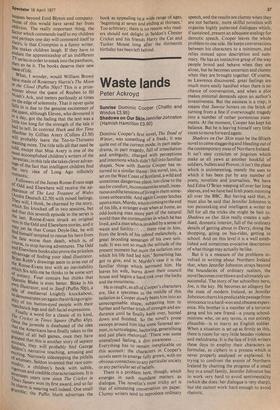Waste lands
Peter Ackroyd
Sunrise Dominic Cooper (Chatto and Windus 0.95)
Shadows on Our SkinJenniferJohnston (Ham ish Hamilton £3.50)
Dominic Cooper's first novel, The Dead of Winter, was something of a freak; it was quite out of the current mode, in part melodrama, in part tragedy, full of irresolution and ambiguity, charged with perceptions and intentions which didn't fall into familiar shapes. Now with Sunrise Cooper has returned to a similar theme: this novel, too, is set on the West Coast of Scotland, a wild and sometimes dangerous place, too close to the sea for comfort, itscommunities small, incestuous andthe tensions of living in them sometimes unbearable. And again Cooper latches upon a man, Murdo, who iscomingto the end of his life, a stranger even when at home, an odd-looking man more part of the natural world than the communities in which he has lived, and a man who is invaded by a sense of waste and futility: `. . there rose in him, from the levels of his inbred melancholy, a great brooding sensation of his own solitude. It was not so much the solitude of the present moment but more the isolation into which his life had led him.' Something has got to give, and in Murdo's case it is the familiar things which surround him. He leaves his wife, burns down their council house and begins a hard trek over the lochs and the mountains.
He is caught, as all of Cooper's characters are, like a specimen in the middle of this isolation as Cooper slowly beats him into an unrecognisable shape, subjecting him to further and further trials of strength and endurance until he finally keels over, hunted down and finished. So the novel's prose swoops around him like some funereal sermon, in turns elegiac, hectoring, generalising and just plain rhetorical: 'There was some unanalysed feeling, a dim awareness • • •• Everything has to remain inexplicable on this account : the characters in Cooper's novels seem to emerge fully grown, with no obvious connection to any particular society or any particular set of beliefs.
There is a problem here, though, which emerges in such mundane matters as dialogue. The novelist's most tricky art is that of simulating conversation on paper. Clumsy writers tend to reproduce ordinary
speech, and the results are clumsy when they are not bathetic; more skilful novelists will organise highly patterned dialogues which, if sustained, present an adequate analogy for demotic speech. Cooper leaves the whole problem to one side. He keeps conversations between his characters to a minimum, and relies instead upon description and summary. He has an instinctive grasp of the way people brood and behave when they are alone, but he becomes uncertain and clumsy when they are brought together. Of course, as Lawrence discovered, great feelings are much more easily handled when there is no chance of conversation, and when a plot makes minimal demands upon an author's inventiveness. But the easiness is a trap; it means that Sunrise hovers on the brink of turning from a fine if overwrought tragedy into a number of rather portentous statements. At the moment, Cooper has kept his balance. But he is leaOng himself very little room to move forward again.
Shadows on Our Skin must be the fiftieth novel to come staggering and bleeding out of the contemporary mess of Northern Ireland. It isn't easy cynicism or jingoism which make us all yawn at another bookful of soldiers, bullets and Provos; it isn't the place which is uninteresting, merely the uses to which it has been put by any number of poets, novelists and journalists. We have had Edna O'Brien weeping all over her long sleeves, and we have had Irish poets intoning all over the BBC. But having said that, it must also be said that Jennifer Johnston is too painstaking and intelligent a writer to fall for all the tricks she might be heir to. Shadows on Our Skin really creates a subdued, domestic interior, full of the ordinary details of getting about in Derry, doing the shopping, going on bus-rides, getting to school. And on this level it is a well established and sometimes evocative description of what things may actually be like.
But it is a measure of the problems involved in writing about Northern Ireland that, when Jennifer Johnston strays beyond the boundaries of ordinary realism, the novel becomes overblown and ultimately unsuccessful. The story of her schoolboy hero, Joe, is the key. He becomes an allegory for the state of modern Ireland, as Jennifer Johnston charts his predictable passage from innocence to a hard-won and obscene experience. His brother is a member of a terrorist gang and his new friend--a young schoolmistress who, on any terms, is not entirely plausible—is to marry an English soldier. When a situation is set up as firmly as this, there is room for very little besides violence and melodrama. It is the fate of Irish writers these days to employ their characters as formulae, as ciphers in a process which is never properly analysed or explained. In trying to confront the events of Northern Ireland by charting the progress of a small boy in a small family, Jennifer Johnston has to work very hard to avoid sentimentality (which she does: her dialogue is very sharp), but she cannot work hard enough to avoid rhetoric.






































 Previous page
Previous page